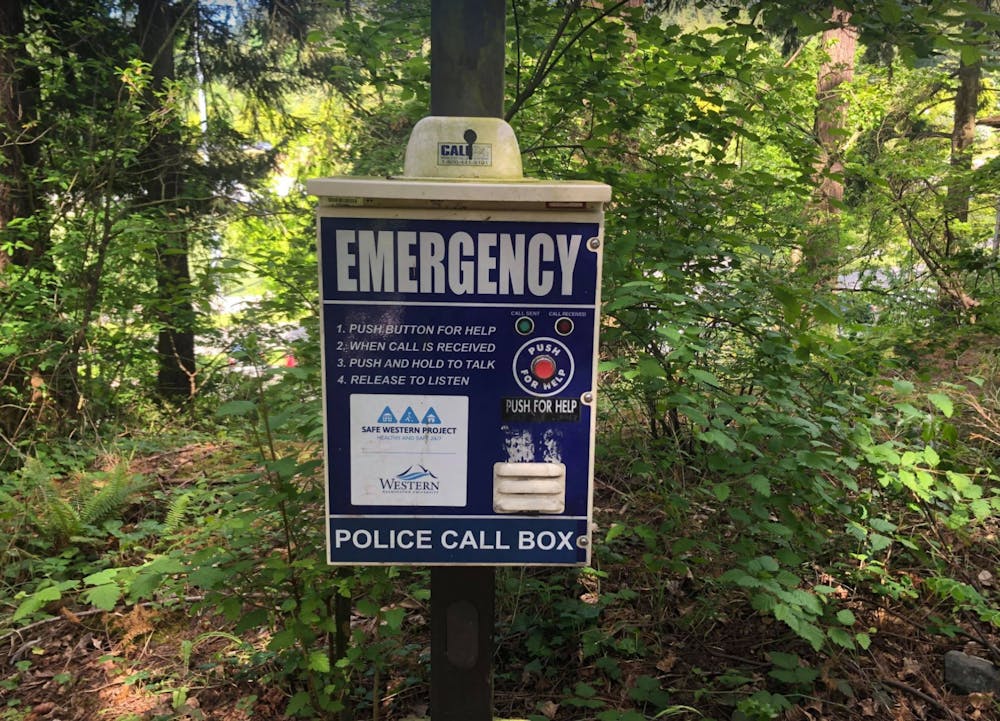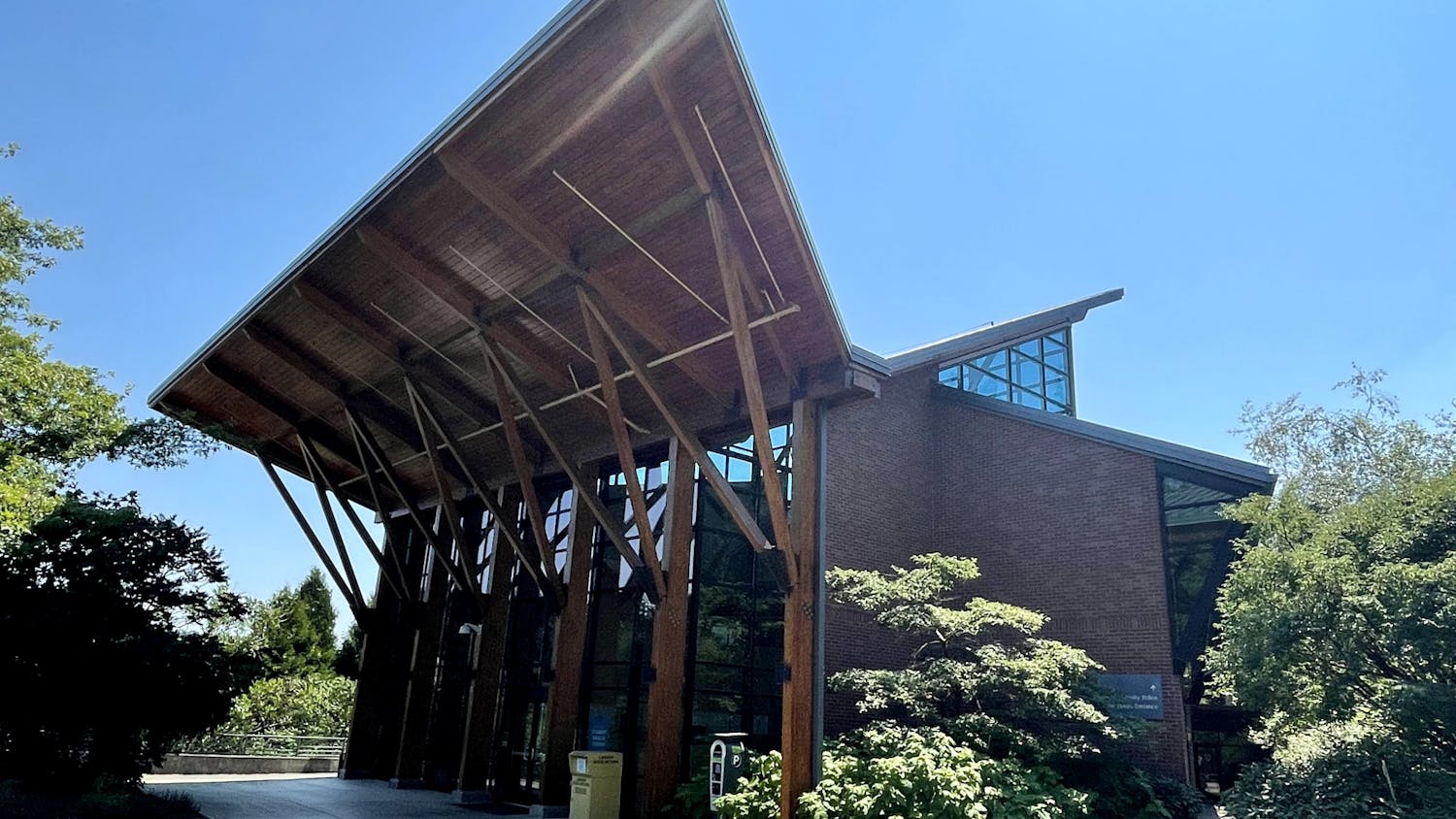Content warning: Descriptions of police brutality
A Western Washington University student has to cross campus in the middle of the night and feels unsafe. The old, Blue Light Alert phones are nowhere to be seen, so they reach out to the university police on a newly installed safety app. Promptly, a campus police officer with the dim light glinting on the lens of their body camera comes to the student’s location and walks them safely across campus.
This could be the future of policing on Western’s campus.
University police have been working on developing and implementing these measures for years, driven by their commitment to keep the campus community safe and their priority of police accountability, said Chief of Police and Public Safety Director Darin Rasmussen
“University police takes police accountability very seriously,” Rasmussen said. “At least as long as I’ve been here, [we’ve had] a history of being accountable to the campus and being responsive to the campus community and it’s concerns.”
Rasmussen started with the UPD in 2014 as the assistant chief of police/assistant director of public and he’s been the chief since 2014, according to Gena Mikkelson, administrative support manager of UPD.
In 2016, UPD worked with Vice President of Business and Financial Affairs Richard Van Den Hul to charter the Campus Community Advisory Council to help keep UPD up to date on student, faculty and staff policing-related concerns, according to Rasmussen.
Now, a little over a year after George Floyd was murdered by police officers in Minneapolis, UPD are doubling down on three accountability measures that were in the works before the events last spring, Rasmussen said.
Body-Worn Cameras
One of these actions is a year-long pilot program for testing six body-worn cameras in the field, Rasumussen said.
The Campus Community Advisory Council recommended body-worn cameras for UPD shortly after they formed, Rasmussen said.
This move is also supported by every officer in the department, Rasmussen said. The City of Bellingham’s Police Department has also been using them for nearly a decade and it’s been working well, he said.
The body-worn camera program will start with a six-month pilot program to test it out and see how the community responds, Rasmussen said.
If the app is effective and well-liked by the campus community, it may eventually replace the Blue Light alert system on campus, Gillham said. There is only one repair firm in the whole country for these emergency call stations and they’re located in North Carolina, according to Paul Cocke, spokesperson for UPD.
UPD is preparing for their first audit now, three years after they started the process. If they get certified, IACLEA will audit UPD every three years, as well as their funding sources including the Student Business Office, to ensure compliance with the best practice standards, Williams said.
“We have to be cognizant of the additional work that it's going to create for folks to download and redact pictures or prepare them and that’s a lot of work, that is not an inconsequential amount of time,” Rasmussen said.
The amount of time and resources that goes into preparing footage for public release is one of the potential drawbacks of body worn cameras, according to Pat Gillham, associate professor in the department of sociology at Western.
“One of the consequences that police departments have been dealing with is the cost of maintaining databases and responding to requests for video footage, right, so there’s a whole cost that gets laid onto police departments that they didn’t have before,” Gillham said.
The launch date of the pilot project is uncertain because the police department is still working on the details but the campus will be made aware of the launch with an event dedicated to it, Rasmussen said.
Gillham questioned the ability for body worn cameras to increase police accountability. One report, the Rialto Study, found a decrease in police misconduct with cameras but others did not, Gillham said.
“They found that these body-worn cameras there in Rialto, California did decrease the use of force by police and police per citizen complaints, but there’s a lot of criticisms of the study,” Gillham said. “Other studies didn’t generate nearly the strength of response or as robust results as Rialto.”
Some of the detracting factors include cameras being turned off when they shouldn’t, and technological glitches such as poor light conditions and adverse weather, Gillham said.
LiveSafe App
Another strategy being implemented is LiveSafe, a safety app to modernize reporting and campus police response time and range, according to UPD Assistant Chief of Police and Assistant Director of Public Safety Keith Williams.
Williams first heard about this app when he was at a conference in Orlando three years ago, and since then he’s been trying to develop it for the Western community, he said.
One of the key driving factors is the ubiquity of smart devices among students, staff and faculty, and a strong dedication to advance public safety on campus, Williams said.
“I was very impressed with LiveSafe because of the many ways that the application can be used to engage our community,” Williams said. “To help them feel safe and engaged.”
Users of the app will be able to videotape, take pictures and directly contact UPD, Greencoats, which are on-foot security guards, BPD, and their classmates, roommates and housemates at Western, Williams said. It will also have an optional Global Positioning System feature in case people don’t know how to describe where they’re located, Williams said.
The pilot project for the app is set to launch this summer, Williams said.
“We still have a few more bells and whistles we want to add,” Williams said. “We’re still engaging our community for additional input so that we can make sure it’s a complete community effort of our stakeholders and our community.”
If the app is effective and well-liked by the campus community, it may eventually replace the Blue Light alert system on campus, Gillham said. There is only one repair firm in the whole country for these emergency call stations and they’re located in New York City, he said.
“That’s one of the big reasons why they’re wanting this app,” Gillham said. “The Blue Light system is in need of a major overhaul, and it’s not cost-effective to do that.”
UPD is conscious of the fact that not everyone has smartphones capable of supporting the LiveSafe app, Chief Rasmussen said.
“I didn’t have a cell phone when I started going to college and it’s a choice or at least of a reality of the world we live in that not everybody has access to everything,” Rasmussen said. “We’re trying to provide as much access as we can to as many people as we can.”
International Accreditation
The last of the changes would be a modification to the University Policing Policy Manual with hundreds of best practice standards by the International Association of Law Enforcement Campus Administrators, a police accountability and oversight organization, Williams said.
All of the law enforcement and public safety procedures carried out by UPD are guided by a policing policy manual that is electronically updated by Lexipol everytime a new law is passed or a court decision is made regarding policing, Williams said.
The International Association of Law Enforcement Campus Administrators Certification that UPD is working on would add 214 standards to this manual that are internationally regarded as best practices for policing, Williams said.
UPD are preparing for their first audit now, three years after they started the process. If they get certified, IACLEA will audit UPD monthly, as well as their funding sources including the Student Business Office, to ensure compliance with the best practice standards, Williams said.
“We want to make sure we are utilizing the best practices and that we’re held accountable to those best practices and we are audited and evaluated on those practices,” Williams said. “You can’t just talk the talk, you’ve got to walk the walk.”
According to Gillham, a lack of standard policing standards and accountability for best practices has led to many of the instances of excessive force and abuse of power that has sown a lack of trust in many communities.
Abdul-Malik Ford, Associated Students president, former president of the Black Student Union and one of the original cosigners of the Black Student Organization Demands which called for defunding UPD said that the institution of policing should be replaced with mental health services.
"So both in light of the policing system on campus and throughout this country, it's just proven that we need to be emphasizing policing less and emphasizing more beneficial resources over that,” Ford said. “We need to put these resources into other systems, it needs to go into mental health. I'd rather be on a campus that has stellar mental health services than a high police presence."
Before coming to Western, Williams was the police chief in Kinloch, Missouri near Ferguson, where Micheal Brown was shot and killed by police, and he said that policing in Washington state and at Western is a lot different than other areas of the country.
“I quickly saw the difference in how policing is done here,” Williams said. “There’s just so many significant positive things I have seen here at Western that I didn’t see a lot of there.”
Jacob O’Donnellis a junior majoring in environmental policy and public relations. He is currently a campus news reporter for The Front and typically writes about issues related to the environment and social justice. He can be reached at jacobodonnell.thefront@gmail.com.






